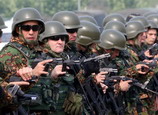
CAIRO, June 16 (Xinhua) -- The recent decision of Egyptian President Mohamed Morsi to cut diplomatic ties with Syria is "harmonious" with the Western policies against Syrian leader Bashar al-Assad, especially that it comes after the United States approved providing arms for the Syrian opposition, analysts said.
On Saturday evening, Morsi told a conference in Cairo that he decided to shut down the Syrian embassy in Cairo and withdraw the Egyptian charge d' affaires from Damascus.
"This is a step that conforms with the recent U.S. escalation to arm the Syrian rebels against Assad's administration and conforms with its deliberation over imposing a no-fly zone on Syria," Gamal Salama, head of political science department at Suez University, told Xinhua.
Salama said Egypt is one of the countries "revolving in the U.S. sphere," and these U.S. allies always make decisions that go in harmony with the U.S. plans.
Morsi also urged Arab and Islamic countries to have an emergency summit on the latest developments in the Syria conflict.
"This summit is meant to provide an Arab cover for any Western escalation against Assad's administration," the political expert said, citing Western attacks on the former governments of Iraq and Libya as examples.
With regards to Morsi's warning to Lebanon's militant group Hezbollah against involvement in the Syria conflict, Salama said that it was meant to please Islamists, particularly the Salafists.
"Morsi needs their support as an intended massive anti-president protests will be held on June 30," he said, adding that the protests will be held by activists and the opposition who call for an ousting of Morsi and an early presidential election.
Momen Kouifatie, a Cairo-based Syrian exile and opposition figure, said the recent U.S. move to arm Syrian anti-government fighters and Morsi's recent decision to cut ties with Assad show international-Arab agreement to end Assad's rule.
"This is a sign that there is an understanding between the international and the Arab communities to end the administration of Assad and to end the interference of Hezbollah in Syria," Kouifatie told Xinhua.
Morsi reiterated that "there is no place for the current Syrian government in the future of Syria," adding that Egypt's leadership, people and army are in support of the Syrian people, but he stressed no-interference in the Syrian domestic affairs.
"I don't understand if Morsi meant that the Egyptian army would help providing the opposition fighters with arms and training just like what the United States decided to do," Kouifatie said.
Jabr al-Shufi, head of the Syrian National Council bureau in Cairo, a major opposition group against Assad, said the U.S. decision to arm the Syrian rebels and Morsi's decision to cut ties with Assad "are not necessarily related," yet he agreed the U.S. position has encouraged Morsi to make such decisions.
















 Developer razes historic Guangzhou structures
Developer razes historic Guangzhou structures


![]()
